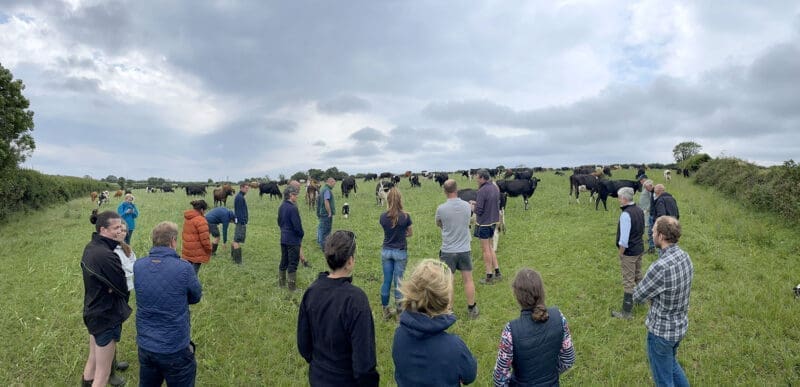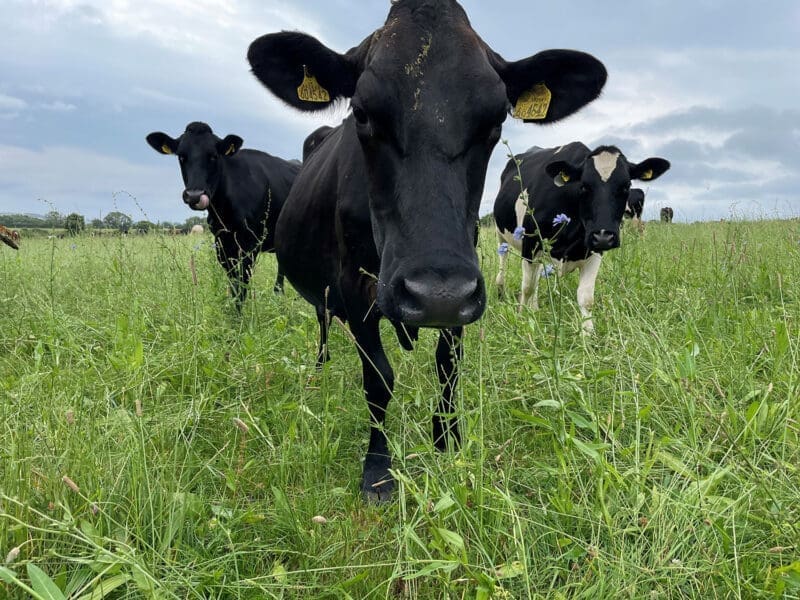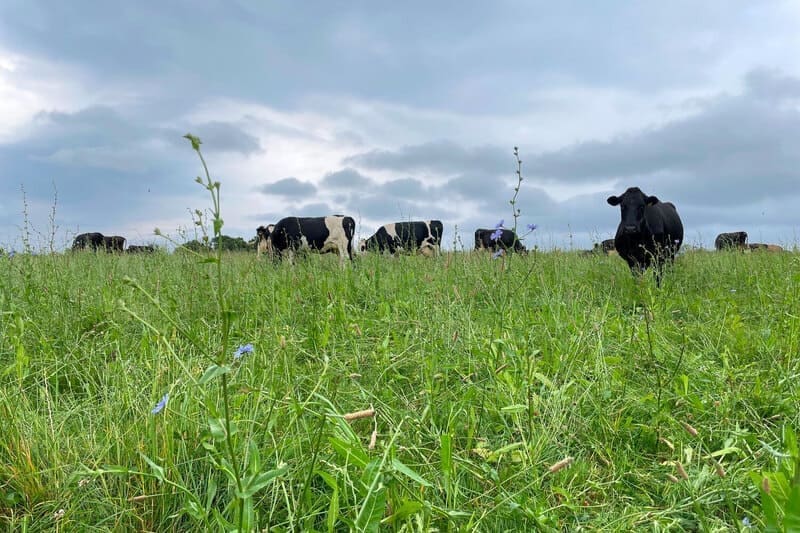Martin Hesp joined us on a farm walk to find out more about recent findings of our regenerative farming journey.
Down in Cornwall the Weather Gods had temporarily selected reverse gear, the heatwave had taken a backseat, and a chill wind was blowing over the hills above the River Fowey. But it didn’t stop entire battalions of swallows and martins busying themselves on the clouds of insects thrown up by a happy looking herd of cows grazing on the rich herbal leys. The flowering chicory and other herbs which had attracted the insects in the first place nodded in the easterly breeze before being consumed by the cows – and just across the fields, beyond stands of newly planted trees, yet more battalions of birds, this time sparrows, were making a fine old racket among the farm buildings where the dairy herd is milked just once a day.
It is worth describing this agricultural scene because there is a lot in the picture which is remarkable. For a start, like so many species of birds, swallows, martins and sparrows are said to be in steep decline – but not at Leyonne Farm, they’re not. Then there’s the insect-attracting mix of herbs and grasses being eaten by the cattle. That doesn’t happen on the average modern dairy farm – nor does the fact that the cows are milked just once a day or that trees have been planted in the middle of fields.
But then, Leyonne is not your average dairy outfit and perhaps it could be said that its owners, Martin and Brigit Whell, are not your archetypical dairy farmers. They are, however, pioneers.
It is no exaggeration to say that the practices they are developing and putting into practice – along with another Cornish farm at Tregleath, near the north coast, run by JJ Willcocks – could be helping to change the way top-quality milk will be produced in this country in the future.
HOW CAN SUCH A CLAIM BE MADE – AND WHY MAKE IT?
Well, we have all heard the modern mantra – eat less meat and dairy, or even cut it out altogether – the received wisdom being that cows belch, poo, and do all manner of other things which are ruinous for the environment.
Now for the headline news… The two Cornish farms mentioned in this article have begun to produce milk which is carbon neutral. Indeed, given the figures, you could go further… Their milk is now carbon negative.
It is a fact – as monitored and measured by a team of experts hired for the job by Trewithen Dairy, the firm which takes milk from some 36 different Cornish farms. After initial discussions a couple of years ago, two of the dairy’s contributing farms (Leyonne and Tregleath) agreed to spearhead research as part of the company’s Earth Milk project. This has meant their agricultural practices and their all-important soils have been under intense scientific scrutiny for the past couple of years.

Hundreds of boreholes have been dug with the help of satellite positioning technology and thousands of soil samples have been sent to independent laboratories. They, in turn, found that – through changes in the way in which the land has been farmed – the organic content of most of the soils tested is increasing year-on-year.
Entire books have been written on exactly what “regenerative farming” means, but basically it translates to adopting careful, well-thought-out, soil-management regimes (that fully utilise the all-important dung produced by cattle) rather than relying on the more straightforward (some would say, harmful) practice of dosing the land with chemicals. The good news for the farmers is that, apart from sequestering carbon (which could one day soon have an economic value in its own right), the naturally produced organic content makes their soils more fertile, which means they spend much less on expensive artificial fertilisers.
Trewithen Dairy’s project is one of a very small number, and possibly the most rigorous UK research programmes of its kind to be carried out on dairy farms looking into what is known as “regenerative agriculture” – and as it continues it seems to be proving that, done the right way, it should be possible for milk to be produced in a manner which will actually sequester more carbon than it produces.
That, as anyone who likes dairy milk in their coffee or tea or on their cereals will realise, is very welcome news indeed. But the people behind the project, the Clarke family who own Trewithen Dairy, are maintaining the careful air of caution which has allowed them to become one of the most respected dairy companies in the country…
“Yes, there is a headline: they have actually sequestered more carbon than the emissions…” said Trewithen Dairy director, Francis Clarke, as we joined a farm-walk at Leyonne in the hills above Golant this week. “But we are nervous when it comes to raving about that, because we know this is a natural process and there can be outside factors which may influence results in future.
“One of the things we’ve been so determined to do with this project is to underline the rigour with which we are testing,” he continued. “And it is important to remember that this is a long-term journey – so we want those year three, four and five data points before we draw real conclusions…
“But there is no denying that the changes made on these farms are having an impact – a positive impact – on carbon storage and sequestration. Ultimately, that means lower carbon milk.”
Francis summed up the project by saying: “What we are doing is working with the farmers in terms of regenerative farming techniques – and doing that in conjunction with the commercial production of milk. What is so good, two-and-a-half years into the project, is actually seeing a milking herd out grazing a herbal ley – and they’re clearly enjoying that pasture among flowers and herbs, which are supporting biodiversity at the same time.
“This is about the need to produce milk commercially in conjunction with nature – supporting biodiversity as well as producing nutritious food off the land,” said Francis.
“It was one of the key objectives when we set up the project – to see if it was possible to produce carbon neutral or carbon negative milk. We believed it was possible. Now we are seeing signs that this is the direction in which we should be moving,” he continued as we waded through the rich pastures. “But what we’ve learned so far is that the real win here is around the wider benefits for water quality, soil quality, biodiversity, wildlife… Actually, carbon and carbon storage is almost a byproduct of good farming and farming with nature.”
Tom Tolputt, of the South West based advisory company, Terrafarmer, is one of the team who’ve been monitoring the two farms. “We were approached by Trewithen Dairy to help them understand what regenerative farming was – looking at regenerative systems, reducing tillage, changing fertiliser policies, using cover crops, the importance of animals and grazing. We began comprehensive soil testing on the two farms – one spring-calving, one autumn-calving – both very engaged businesses which already showed good rotational grazing practices.
“We used electric negativity scanners in 180 sampling points on each farm and we tested for organic matter and basic nutrients. The idea was that we could revisit those sites using GPS tags, which we did this spring. And we had one farm which had a small net gain in organic matter – and one farm with an extraordinary aggregation of carbon,” said Tom, explaining that, using the data, they could calculate the carbon quantity and the amount of sequestration.

The team also ran a second blind-farm-carbon-toolkit test separately – and both sets of data came back with very similar results.
“Both tests went to two independent laboratories,” said Tom. “We want to learn from this and we want to show that this rigorous data is accurate. We’ve gone through it several times. And the data would suggest that we have sequestered several thousand tonnes of carbon across the two 300 hectare units over this period.
“We have known for a long time that good livestock management and grazing can sequester carbon and build soil health – perennial crops are wonderfully restorative to soil health and grazing these crops in the right manner can really pump down a lot of carbon from the plant into the soil. The data came back way in excess of what we were expecting and it has basically suggested you can produce high quality nutritious food in a carbon positive manner.”
Brigit Whell and husband Martin took us on the walk around their farm and their passion and enthusiasm for the new ways in which they are producing milk was obvious to see…
“The word ‘journey’ is a good way to describe what we are doing. There have been so many changes imposed on farmers recently, everyone’s having to think about moving forward. And regenerative farming is a journey – it’s not just something you switch into,” said Brigit, explaining that she meant this in both human terms and with reference to the soil.
“It’s actually about transitioning the soil – which has been doing what we’ve wanted it to do with nitrogen fertilisers and whatever else. But if you want to grow with less fertiliser, you can’t just take it away – they reckon it takes about five years to get to where we’d like to be – (i.e.) not relying on chemical bagged nitrogen fertilisers at all. The soil is everything. We think we are farming cows, but actually we can only do that if the soil is right. Whatever you farm, ultimately it depends on soil – if we can get it right everything else blossoms on top of that.
“Having soil is like having another livestock enterprise, because you have to feed it, keep it healthy, you have to have everything in balance… Just the same as we do for cows,” said Brigit who, by the way, pointed to a number of young women who’d joined the farm walk, saying that there was a wonderful future for them within what she regards as an exciting new dairy industry.
“When we are looking at all the other things we can do – like using all the methane off the slurry pit – there are thoughts that we can take the entire dairy farm off-grid. Even the tractor! If we can do that on renewable and cyclical energy, we are not just going to be carbon neutral – we will be holding onto carbon every time we produce a litre of milk. It is exactly the opposite story from the one being bandied around about giving up meat and dairy,” smiled an enthusiastic Brigit.”
It is an extraordinary story. I have been on many farm visits during my long career as a journalist, but the walk around Leyonne Farm with Trewithen Dairy on Wednesday was the most memorable and remarkable of the lot. And it is very much a case of: watch this green space…
